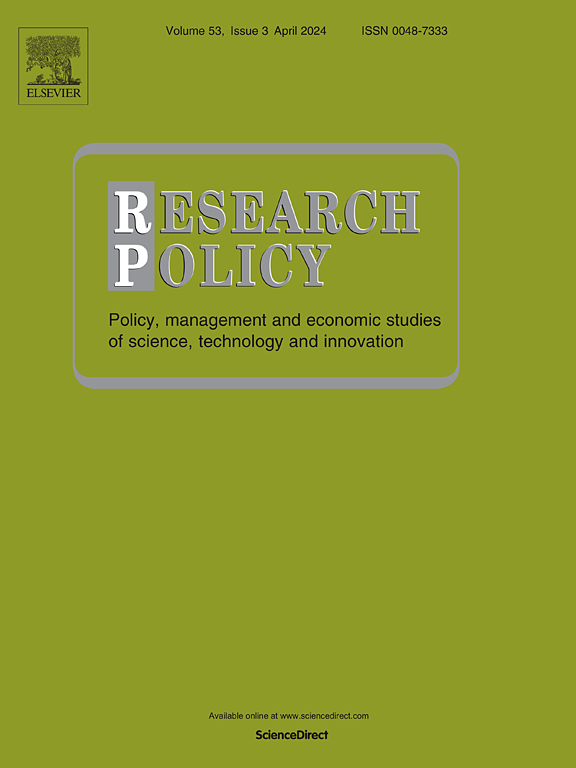"后门见":学术企业家绕过技术转让办公室的多重案例研究
IF 8
1区 管理学
Q1 MANAGEMENT
引用次数: 0
摘要
本文研究了学术创业中绕过技术转让办公室(TTO)这一未被充分探索的现象。虽然设立技术转让办公室的目的是集中和支持以知识产权为基础的商业化,但相当一部分创业项目却避开了技术转让办公室。本研究基于经济学(交易成本理论)和伦理学(泰勒的正义模型)两方面的考虑,探讨了研究人员决定使用技术性贸易机会以外的手段将发明商业化背后的动机和背景因素。 这项多案例研究采用了深入的探索性定性方法,调查了加拿大大学不同学科的五位学术创业者,他们选择绕过技术性贸易机会,往往违反了机构政策。我们的研究结果揭示了个人动机、机构政策和市场现实之间复杂的相互作用。在这一过程中,我们发现了四种意识和战略意图的路径,从无意的不遵守到策略性的回避,这些路径挑战了将绕过技术性贸易机会仅仅视为无意而非故意的简单看法。研究还揭示了促进绕过技术性贸易机会的四种重叠背景:对个人专业知识的信心、以前使用技术性贸易机会的负面经验、受同行影响的怀疑态度以及外部合作伙伴的挑战。此外,研究结果表明,绕过技术性贸易机会的原因包括经济和道德动机,这些动机引导学术创业者选择其他私人管理的商业化道路。文章最后就如何解决绕过技术性贸易机会的多方面动机,对大学管理者和政策制定者提出了一些启示。本文章由计算机程序翻译,如有差异,请以英文原文为准。
“Meet me at the backdoor”: A multiple case study of academic entrepreneurs bypassing their technology transfer offices
This article investigates the underexplored phenomenon of technology transfer office (TTO) bypassing in academic entrepreneurship. While TTOs are established to centralize and support intellectual property-based commercialization, a significant portion of entrepreneurial projects avoid the TTO. Relying on both economic (transaction cost theory) and ethical (Tyler's justice model) considerations, this study explores the motivations and contextual factors behind a researcher's decision to commercialize an invention using means other than the TTO. This multiple case study employs an in-depth exploratory qualitative approach to investigate five academic entrepreneurs across different disciplines in Canadian universities who chose to bypass their TTO, often in contravention of institutional policies. Our findings reveal a complex interplay among individual motivations, institutional policies, and market realities. We identified four paths of awareness and strategic intent in this process ranging from unintentional non-compliance to tactical avoidance which challenge a simplistic perception of TTO bypassing as merely unintentional rather than deliberate. The study also reveals four overlapping contexts that promote TTO bypassing: confidence in personal expertise, previous negative experience of using the TTO, peer-influenced skepticism, and external partner challenges. Furthermore, the findings show that the reasons for bypassing include both economic and ethical motivations which steer academic entrepreneurs toward alternative, privately managed commercialization paths. The article concludes with some implications for university managers and policymakers related to how to address the multifaceted motivations for TTO bypassing.
求助全文
通过发布文献求助,成功后即可免费获取论文全文。
去求助
来源期刊

Research Policy
MANAGEMENT-
CiteScore
12.80
自引率
6.90%
发文量
182
期刊介绍:
Research Policy (RP) articles explore the interaction between innovation, technology, or research, and economic, social, political, and organizational processes, both empirically and theoretically. All RP papers are expected to provide insights with implications for policy or management.
Research Policy (RP) is a multidisciplinary journal focused on analyzing, understanding, and effectively addressing the challenges posed by innovation, technology, R&D, and science. This includes activities related to knowledge creation, diffusion, acquisition, and exploitation in the form of new or improved products, processes, or services, across economic, policy, management, organizational, and environmental dimensions.
 求助内容:
求助内容: 应助结果提醒方式:
应助结果提醒方式:


